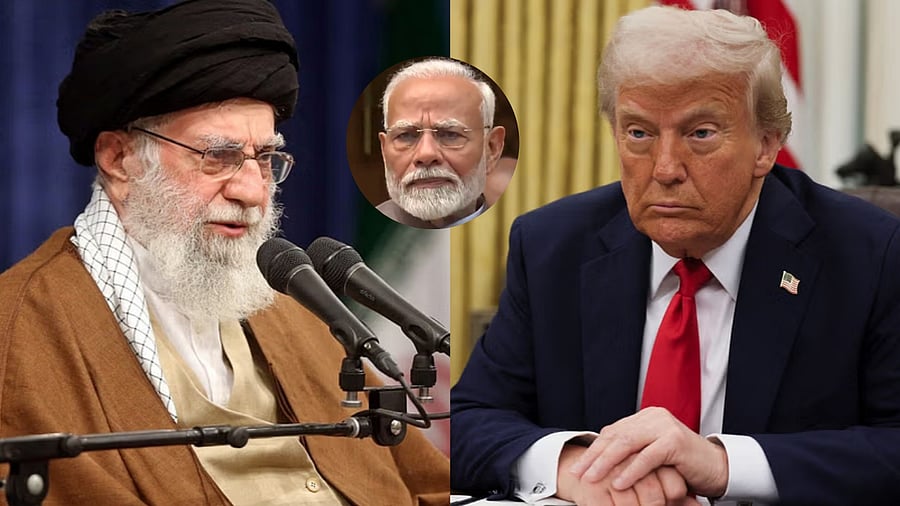
Iran's Supreme Leader Ayatollah Ali Khamenei(Left), US President Donald Trump (Right), PM Modi(centre)
Credit: Reuters File Photo, X/@narendramodi
United States President Donald Trump is not known for subtlety. Still, even by his standards, the US president’s threat over the weekend to bomb Iran if it does not agree to a nuclear deal marks a potentially dangerous escalation, as he tries to reshape West Asia according to Washington’s vision.
Of course, there’s a deep irony in Trump’s warning. He, after all, had pulled the US out of a nuclear deal with Iran early into his first term, accusing his then predecessor, Barack Obama, of being soft on Tehran.
By withdrawing from that pact and imposing tough sanctions against Iran, Trump killed any incentive for Tehran to seek a rapprochement with Washington. Joe Biden, whose four years in the White House have been bookended by Trump terms, continued with most sanctions against Iran.
Now, Trump wants to renegotiate a nuclear deal with Iran. While the terms of his offer are unclear, it’s a safe bet that whatever he proposes will be loaded far more in Washington’s favour than the original Obama-era pact.
Iran has agreed to indirect talks with the US, through an intermediary like Oman, while also hitting out at Trump for his threatening words and tone. Supreme Leader Ayatollah Khamenei has warned that Iran would strike a “strong blow” in response if attacked. Others in the Iranian leadership have pointed out that the US has thousands of troops posted at its many bases in West Asia — all within range of Iran’s missiles.
To be sure, there is a glass-half-full element to all of this.
Trump is seeking a diplomatic deal with Iran as his first preference — which is very different from his approach when he first came to power in 2017. He appears to recognise that Iran today is significantly weaker than it was then, its economy battered by sanctions, its regional heft shredded by setbacks to allies Hamas, Hezbollah, and the ousted Syrian leader Bashar al-Assad. To that extent, it’s a smart time — from the US perspective — to pressure Iran to agree to a deal it might otherwise never accept.
That Iran has not ruled out talks is also a sign that Tehran acknowledges that it needs to try to engage Trump.
But unless Trump is genuinely committed to a negotiated settlement that includes incentives for Iran to enforce the deal, any talks could fall apart quickly. And because the US president has already publicly articulated what he plans to do in such a scenario, Trump will then be under pressure to launch a military campaign against Iran.
That pressure won’t just come from hawks within his party or sections of the national security establishment in Washington. It will also come from Israeli Prime Minister Benjamin Netanyahu, who has long advocated for the US to be aggressive in its approach towards Iran.
For India, all of this is a major cause for concern.
While the Narendra Modi government has stopped importing Iranian oil in keeping with US sanctions against Tehran, it has maintained firm relations with Iran. Road transport minister Nitin Gadkari attended the inauguration of current Iranian President Masoud Pezeshkian last year. In May, India recommitted to the development of parts of Iran’s Chabahar Port through a 10-year contract.
The port, for which India and Iran first signed a deal in 2015, is critical for New Delhi’s efforts to build trade and transport corridors with landlocked Afghanistan and Central Asia without needing to go through Pakistan.
Already, Trump, though an executive order, has ended a sanctions waiver for India to develop the Chabahar Port. The prospect of military tensions between the US and Iran could bury any hopes India might have of keeping that project afloat.
With Israel’s brutal war on Gaza still ongoing, and Israel also attacking Syria and Lebanon, West Asia is already aflame. Any military conflagration between Iran and the US will almost certainly spill over and explode in unpredictable ways across the region — Tehran has armed allies in multiple countries in West Asia, while Washington has strategic outposts that could become targets.
India will not want that: A wider Iran-US proxy war in West Asia will raise oil prices, and complicate New Delhi’s efforts to build strong ties with countries across ideological and religious divides in the region.
A war with Iran would also erode a central plank of Trump’s political appeal — his promise that he would end wars, not start new ones. Indeed, while there were moments during his first term when the US appeared to be on the brink of conflict with Iran — especially following the assassination of the Iranian general, Qasem Soleimani — Trump managed to pull Washington back from the brink.
Yet, in moments of high tension, such carefully calibrated attacks are risky to pull off. All it needs is a miscalculation by either the US or Iran for a full-fledged conflict to break out.
(Charu Sudan Kasturi is a senior journalist focusing on international relations, trade, energy, and technology. Twitter: @CharuKasturi.)
Disclaimer: The views expressed above are the author's own. They do not necessarily reflect the views of DH.